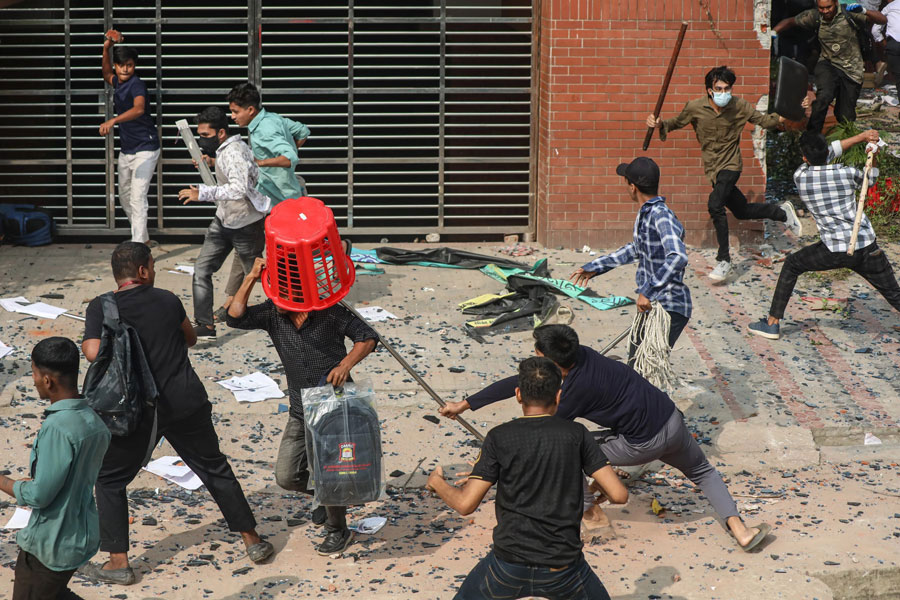
Published :
Updated :

Post-revolution period is a highly testing time. Because it is a transition period, counter forces try to hit back when the administration is yet to consolidate and remains at its most vulnerable. But this commonly held perception at times may be logically flawed. An uprising can draw diverse forces with agendas dissimilar or even contradictory to one another into its vortex. Not many of them are smart enough to camouflage their ulterior motives under the veneer of agreeable rhetoric. But there are crafty practitioners of politics who know what the audience likes to hear and they do not disappoint the latter.
The post-uprising turn of events may not follow the chosen course of the main actors of the momentous political changeover. If the achievement comes through widespread violence claiming a large number of lives, it leaves behind a legacy of brutality as a new social norm. The prevalence of violence seeps into the collective psyche unaware. This is exactly what has been witnessed in Bangladesh during the past few days.
True, some of the events that took place of late smacks of remotely orchestrated plots against the interim government. The mysterious public gathering supposed to be held at Shahbagh with the lure of disbursement of interest-free loan of Tk100,000 to each participant certainly needs thorough analysis and investigation to get to its root. However, the handling of the delicate International Society for Krishna Consciousness (ISKCON) issue with its far and wider implications has not helped the matter. Irresponsible remarks and comments on this have the potential of stoking communal hatred and violence. Protest rallies held before the offices of two newspapers in the city are a clear indication of intolerance and arm-twisting tactic.
It is against such a backdrop, Secretary General of the BNP Mirza Fakhrul Islam Alamgir has made a very important observation on the turn of events of the past few days. His critical comment is that even before the passage of three months of the uprising, some of the parties have started to expose their real identities. If this is how, he lamented, partners in the movement against the deposed regime invite rifts between and among them, it will be impossible to achieve the intended objectives.
No, Mirza Fakhrul did not elaborate on the subject but it is clear he did not like the recent incidents of violence and their handling by all concerned. As a seasoned politician, Fakhrul Islam is fully aware of stepping into the trap and endangering the process of consolidating national unity at this critical time.
The student-led mass uprising has rightly been praised for its uniqueness. But leading such a movement is one thing and protecting and sustaining the spirit are quite another. In fact, many social thinkers are of the opinion that if organising a revolution is tough, preserving its fruits is tougher. Counter forces within the fold are at work to hijack the outcome of such revolts. There is no need to look beyond the post-liberation Bangladesh of the mid-1970s when coups and counter-coups followed in succession to muddle the future of democracy in this country.
Forces inimical to the country's independence and militant groups with their alleged connection to the feared Al Qaeda and Taliban have not vanished from the scene. Some of the attacks on sensitive buildings and infrastructure bear hallmarks of terrorist organisations. Thanks to deposed autocratic ruler Sheikh Hasina's pampering of certain controversial quarters, society has become more conservative than liberal. The rise of conservatism is set to offset the country's journey on course of liberal democracy. So, it is always wise to be on guard against not only the enemies with their loyalty to the ousted regime but also to other forces not compatible with the country's cherished destiny.
A single-minded conspiracy theory can prove inadequate to explain the multi-dimensional political pulls and pressures. Apart from Shahbagh and ISKCON incidents, there were pitch battles between students from different colleges at Science Laboratory intersection, in old Dhaka and also in Jatrabari. So brutal and insidious were the latest such clashes that defy any rationality and human feeling. Why? This does not go with the champion students' mindset. Actually, violence has become ingrained in the psyche only to be used as a weapon to settle scores or even for the 'fun' of it. The motive behind may be to destabilise the government and society but the perpetrators may not always be the same. Different parties with different devious agendas may be out to fish in the muddy water. The need is to pinpoint them precisely to know what exactly is brewing up with the objective of making the country unviable.
In this respect, the concern expressed by the All-Party Parliamentary Group for the Commonwealth, a multi-party group in the House of Commons of the United Kingdom about the current developments in Bangladesh cannot be taken lightly. Bangladesh must not miss the opportunity of rising to the occasion in performing its historic obligation of realising the dreams of a society free of exploitation and discrimination as envisaged by the three million martyrs of the liberation war and their counterparts of the successful movement triggering the fall of Hasina government.
nilratanhalder2000@yahoo.com


 For all latest news, follow The Financial Express Google News channel.
For all latest news, follow The Financial Express Google News channel.